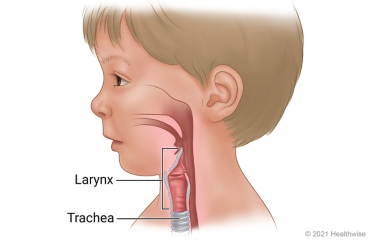
Overview
Croup is an infection that causes swelling in the windpipe (trachea) and voice box (larynx). The swelling causes a loud, barking cough and sometimes makes breathing hard. Croup can be scary for you and your child, but it is rarely serious. In most cases, croup lasts from 2 to 5 days and can be treated at home.
Croup usually occurs a few days after the start of a cold and in most cases is caused by the same virus that causes the cold. Croup is worse at night but gets better with each night that passes.
Sometimes a doctor will give medicine to decrease swelling. This medicine might be given as a shot or by mouth. Because croup is caused by a virus, antibiotics will not help your child get better. But children sometimes get an ear infection or other bacterial infection along with croup. Antibiotics may help in that case.
The doctor has checked your child carefully, but problems can develop later. If you notice any problems or new symptoms, get medical treatment right away.
Follow-up care is a key part of your child's treatment and safety. Be sure to make and go to all appointments, and call your doctor if your child is having problems. It's also a good idea to know your child's test results and keep a list of the medicines your child takes.
How can you care for your child at home?
Medicines
- Have your child take medicines exactly as prescribed. Call your doctor if you think your child is having a problem with any medicine.
- Give acetaminophen (Tylenol) or ibuprofen (Advil, Motrin) for fever, pain, or fussiness. Do not use ibuprofen if your child is less than 6 months old unless the doctor gave you instructions to use it. Be safe with medicines. For children 6 months and older, read and follow all instructions on the label.
- Do not give aspirin to anyone younger than 20. It has been linked to Reye syndrome, a serious illness.
- Be careful with cough and cold medicines. Don't give them to children younger than 6, because they don't work for children that age and can even be harmful. For children 6 and older, always follow all the instructions carefully. Make sure you know how much medicine to give and how long to use it. And use the dosing device if one is included.
- Be careful when giving your child over-the-counter cold or flu medicines and Tylenol at the same time. Many of these medicines have acetaminophen, which is Tylenol. Read the labels to make sure that you are not giving your child more than the recommended dose. Too much acetaminophen (Tylenol) can be harmful.
Other home care
- Offer plenty of fluids. Give your child water or crushed ice drinks several times each hour. You also can give flavored ice pops.
- Try to be calm. This will help keep your child calm. Crying can make breathing harder.
- Give your child a hug, or offer a favorite toy.
- Sleep in or near your child's room to listen for any increasing problems with their breathing.
- Keep your child away from smoke. Do not smoke around your child or in your house, and avoid being around others who are smoking.
- Wash your hands and your child's hands often so that you don't spread the illness.
When should you call for help?
Call 911 anytime you think your child may need emergency care. For example, call if:
- Your child has severe trouble breathing.
- Your child's skin and fingernails look blue.
Call your doctor now or seek immediate medical care if:
- Your child has new or worse trouble breathing.
- Your child has symptoms of dehydration, such as:
- Dry eyes and a dry mouth.
- Passing only a little urine.
- Feeling thirstier than usual.
- Your child seems very sick or is hard to wake up.
- Your child has a new or higher fever.
- Your child's cough is getting worse.
Watch closely for changes in your child's health, and be sure to contact your doctor if:
- Your child does not get better as expected.
Where can you learn more?
Go to http://www.healthwise.net/patientEd
Enter M301 in the search box to learn more about "Croup in Children: Care Instructions".
Current as of: October 24, 2024
Author: Ignite Healthwise, LLC Staff
Clinical Review Board
All Ignite Healthwise, LLC education is reviewed by a team that includes physicians, nurses, advanced practitioners, registered dieticians, and other healthcare professionals.

